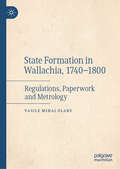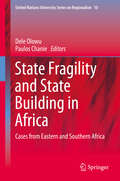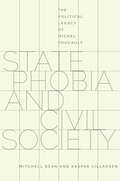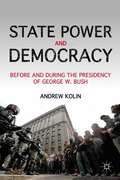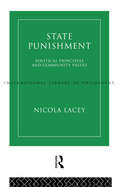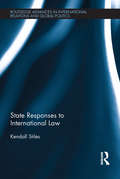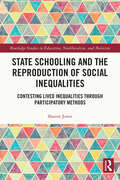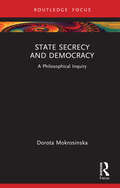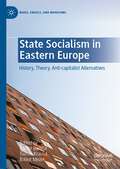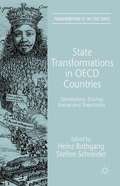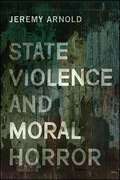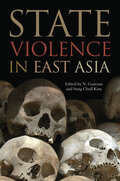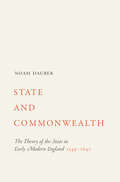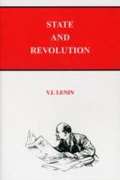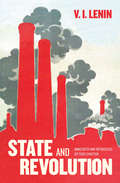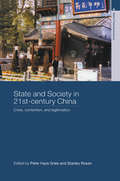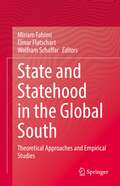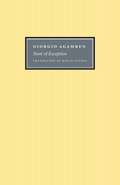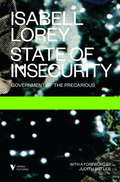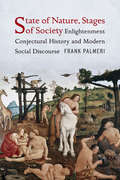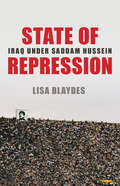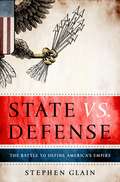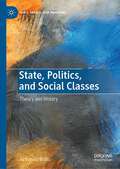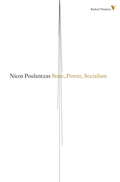- Table View
- List View
State Formation in Wallachia, 1740–1800: Regulations, Paperwork and Metrology
by Vasile Mihai OlaruThis book explores the transformation of the state in Wallachia, an Ottoman tributary principality, between 1740 and 1800, by focusing on three administrative techniques: regulations, paperwork (registers, identification certificates), and weights and measures. The implementation by the central power of regulations, bookkeeping, certificates, and standard units of measurement was not smooth, but it nevertheless heralded the beginning of the struggle against localism and the efforts to extend the boundaries of legitimate state action. The author challenges the (mostly Romanian) historiography of the Phanariot period, which has portrayed the state as a set of institutions undertaking certain responsibilities and has insisted almost exclusively on its extractive function and abusive character. Instead, this book takes a closer look at how the Wallachian state functioned, examining how its means of interacting with its subjects changed in the second half of the eighteenth century. Rethinking the problem of the state in eighteenth-century Wallachia, traditionally regarded as a mere instrument of Ottoman domination, it claims that it was precisely during this time that the bases of modern statehood were laid in a context defined by imperial rivalries (Ottoman, Habsburg, Russian) in the region. Making the case for state formation in the absence of preparation for war, the author also stresses, in contrast to recent contributions that decentre the state, the need to study the process whereby the effect of state coherence is produced. While focusing on Wallachia, this book provides valuable reading for those interested in early modern administrative and legal history, the history of state formation, and Southeast European history more generally.
State Fragility and State Building in Africa
by Dele Olowu Paulos ChanieThis book describes the contrast between the strong economic growth and democratization that have occurred in Africa and its stalling political progress. It presents and discusses fragility as the phenomenon that has caused the state to remain weak and faltering and has led to at least one third of the continent's citizens living in fragile states. Following the examination of the drivers of fragility and the impact of fragility on citizens and neighbouring states, the book discusses capacity building approaches. This part shows how effective states can be built on the African continent, a process that would result in a change from state fragility to state resilience. It is based on lessons learnt from close studies of the nations where the state has been most developed in the region, in Eastern and Southern Africa. The book provides and responds to the most recent and up-to-date information on African development and uses insights of people who have lived and worked in the continent for most of their lives.
State Phobia and Civil Society
by Mitchell Dean Kaspar VilladsenState Phobia draws extensively upon the work of Michel Foucault to argue for the necessity of the concept of the state in political and social analysis. In so doing, it takes on not only the dominant view in the human sciences that the concept of the state is outmoded, but also the large interpretative literature on Foucault, which claims that he displaces the state for a de-centered analytics of power. Understanding Foucault means understanding all his interlocutors--whether Marxists, Maoists, neoliberals, or social democrats. It requires turning to Foucault's colleagues, including Deleuze and Guattari, François Ewald, and Blandine Kreigel, in relation to whom he carved out a position. And it entails an examination of his legacy in Hardt and Negri, the theorists of Empire, or in Nikolas Rose, the influential English sociologist. Foucault's own view is highly ambiguous: he claims to be concerned with the exercise of political sovereignty, yet his work cannot make visible the concept of the state. Moving beyond Foucault, the authors outline new ways of conceiving the state's role in establishing social order and in mediating between an inequality-producing capitalist economy and the juridical equality and political rights of individuals. Arguing that states and their cooperation remain of vital importance to resolving contemporary crises, they demonstrate the interdependence of state and civil society and the necessity of social forms of governance.
State Power and Democracy
by Andrew KolinState Power and Democracy is the first book to show that the Bush police state didn't commence when Bush was inaugurated. It proves, instead, that the seeds of an American police state can be traced all the way back to the founding of the republic.
State Power and Governance in Early Imperial China: The Collapse of the Qin Empire, 221–207 BCE (SUNY series in Chinese Philosophy and Culture)
by Chun Fung TongState Power and Governance in Early Imperial China delves into the governance and capacity of the state by providing an empirical historical study of the collapse of China's Qin Empire. In contrast to the popular view that the Qin fell suddenly and dramatically, this book argues that the collapse was rooted in persistent structural problems of the empire, including the serious resource shortages experienced by local governments, inefficient communication between administrative units, and social tensions in the new territories. Rather than reducing Qin rulers to heartless villains who refused to adjust their policies and statecraft, this book focuses on the changes that the regime did make to meet these challenges. It reveals the various measures that Qin rulers devised to solve these problems, even if they were ultimately to no avail. The paradox of the Qin Empire seemed to be that, although the regime's policies and reforms could theoretically have strengthened the state's power and improved the governance of the empire, their ramifications simultaneously exacerbated the misfunction of local governments and triggered the military failures that eventually destroyed the empire.
State Punishment: Political Principles And Community Values (International Library of Philosophy)
by Nicola LaceyNicola Lacey presents a new approach to the question of the moral justification of punishment by the State. She focuses on the theory of punishments in context of other political questions, such as the nature of political obligation and the function and scope of criminal law. Arguing that no convincing set of justifying reasons has so far been produced, she puts forward a theory of punishments which places the values of the community at its centre.
State Responses to International Law: Who Complies? (Routledge Advances in International Relations and Global Politics)
by Kendall StilesDo countries keep their promises to the international community? When they sign treaties or learn about new expectations, do they take them seriously and implement them? Since we already know intuitively that not all countries do, the next question – and the topic of this book – is: who complies? By considering a wide range of different rules – each precise enough to allow one to measure state compliance – and a variety of methods, we hope to answer this question once and for all. Including a systematic analysis of 8 different countries selected for the variety of regime type, international engagement and economic development they represent, the work caps a five-year research program and represents the culmination of twenty years’ worth of work in the disciplines of international relations and international law on legalization and compliance. Stiles highlights the importance of systematic study of compliance in order to move further towards solving truly global issues, such as terrorism, human trafficking, air pollution and collective goods provision. With international laws generally designed to improve the human condition and current levels of compliance inconsistent at best, it is vital to gain a better understanding of who complies and why. This detailed study will be of interest to students of Politics, International Law and International Relations.
State Schooling and the Reproduction of Social Inequalities: Contesting Lived Inequalities through Participatory Methods (Routledge Studies in Education, Neoliberalism, and Marxism)
by Sharon JonesThis book critically explores the role of state schooling in the reproduction of social class inequalities in the United Kingdom. By uniquely combining critical ethnographic methods with participatory and visual research, it foregrounds the experiences and recollections of working-class adults in relation to their past schooling. Drawing upon her own lived experiences, Jones theorises the experiences of her participants using an analysis of Marxist, Bordieuan, and Freirean frameworks to uncover relations of power and illustrate how schooling has reduced individual agency and sustained lived inequalities. By creating space for a Visual Intervention within Critical Ethnography (VICE) alongside her analysis of class and society, Jones successfully illuminates that working class struggles are not permanent, and that agency can be activated. The book also addresses an important need by centering research from the lived educational experiences of the working-class, and in particular, working-class adults. Making a unique theoretical and methodological contribution using an innovative combined methodology approach, the text ultimately highlights the potential of empowering disadvantaged individuals by raising critical consciousness. Though it is focused on the experiences of adults, this book has important understandings for all sectors of education and will be of interest to academics, researchers, and students interested in the sociology of education, research methods in education, social inequality, social class, and education politics.
State Secrecy and Democracy: A Philosophical Inquiry (Routledge Focus on Philosophy)
by Dorota MokrosinskaIn the wake of controversial disclosures of classified government information by WikiLeaks and Edward Snowden, questions about the democratic status of secret uses of political power are rarely far from the headlines. Despite an increase in initiatives aimed at enhancing government transparency – such as freedom of information or sunshine laws – secrecy persists in both the foreign and domestic policy of democratic states, in the form of classified intelligence programs, espionage, secret military operations, diplomatic discretion, closed-door political bargaining, and bureaucratic opacity. This book explores whether the state’s claim to restrict access to information can be justified. Dorota Mokrosinska answers this question with a qualified "yes," arguing that secrecy in exercising executive and legislative power can be seen as a legitimate exercise of democratic authority rather than as its justified suspension. Past and recent examples of state secrecy are used throughout the book, including the Manhattan Project, decision-making leading to the Iraq War, the extraordinary renditions programs and secret detention sites in Eastern Europe, collaboration between international secret services, and the WikiLeaks and Snowden disclosures. State Secrecy and Democracy: A Philosophical Inquiry is essential reading for those in political philosophy, ethics, politics, international relations and security studies, and law.
State Socialism in Eastern Europe: History, Theory, Anti-capitalist Alternatives (Marx, Engels, and Marxisms)
by Eszter Bartha Tamás Krausz Bálint MezeiThis volume brings together a diverse set of scholars to address the long theoretical, conceptual and political debate on the interpretation of “actually existing” socialism in the Soviet Union and Eastern Europe. While the major paradigms – totalitarianism, neo-totalitarianism, revisionism, post-revisionism, modernization, and the world-system analysis – are well known in the Western (English-language) literature, the concept of state socialism, which has strong theoretical roots in Hungary (going back to the works of György Lukács and István Mészáros) received less international attention. This book contributes to a productive discussion about viable alternatives to capitalism by introducing and theoretically elaborating on the concept and practice of state socialism, highlighting the historical significance of Hungary’s experiment with the “new economic mechanism” of 1968. It generates a common point of reference for various generations of anti-systemic thinkers, scholars, and activists to move beyond Cold War simplifications and ideological divides, and contributes to the discussion about anti-capitalist alternatives, which are relevant today for the global left. The chapter “Dance Around a ‘Sacred Cow’: Women’s Night Work and the Gender Politics of the Mass Worker in State-Socialist Hungary and Internationally” is available open access under a Creative Commons Attribution-NonCommercial- NoDerivatives 4.0 International License via link.springer.com.
State Transformations in OECD Countries
by Heinz Rothgang Steffen SchneiderThe democratic nation state of the post-war era has undergone major transformations since the 1970s, and political authority has been both internationalized and privatized. The thirteen chapters of this edited collection deal with major transformations of governance arrangements and state responsibilities in the countries of the OECD world. A unified conceptual and explanatory framework is used to describe trajectories of state change, to explain the internationalization or privatization of responsibilities in the resource, law, legitimacy and welfare dimensions of the democratic nation state, and to probe the state's role in the today's post-national constellation of political authority. As the contributions show, an unravelling of state authority has indeed occurred, but the state nevertheless continues to play a key role in emerging governance arrangements. Hence it is not merely a 'victim' of globalization and other driving forces of change.
State Violence and Moral Horror
by Jeremy ArnoldCan state violence ever be morally justified? In State Violence and Moral Horror, Jeremy Arnold critically engages a wide variety of arguments, both canonical and contemporary, arguing that there can be no justification. Drawing on the concept of singularity found in the work of French philosopher Jean-Luc Nancy, Arnold demonstrates that any attempt to justify state violence will itself be violent and, therefore, must fail as a justification. On the basis of this argument, the book explores the concept of "moral horror" as the experience of living amidst and acquiescing to unjustifiable state violence. The careful explanation of arguments from across the spectrum of political theory and exceptionally clear prose will enable both advanced undergraduates and more general readers interested in political thought to understand and engage the central argument. State Violence and Moral Horror is a unique contribution to the growing literature on violence and will be of interest to political theorists and philosophers in both the analytic and continental traditions, philosophers of law, international relations theorists, law and society scholars, and social scientists interested in normative aspects of state violence.
State Violence in East Asia (Asia In The New Millennium Ser.)
by N. Ganesan and Sung Chull Kim“A significant contribution to scholarship on post-World War II Asia generally, and Cold War Asia specifically.” —John E. Van Sant, author of Pacific PioneersThe world was watching when footage of the “tank man” —the lone Chinese citizen blocking the passage of a column of tanks during the brutal 1989 crackdown on protesters in Beijing’s Tiananmen Square—first appeared in the media. The furtive video is now regarded as an iconic depiction of a government’s violence against its own people. Throughout the twentieth century, states across East Asia committed many relatively undocumented atrocities, with victims numbering in the millions. The contributors to this insightful volume analyze many of the most notorious cases, including the Japanese army’s Okinawan killings in 1945, Indonesia’s anticommunist purge in 1965–1968, Thailand’s Red Drum incinerations in 1972–1975, Cambodia’s Khmer Rouge massacre in 1975–1978, Korea’s Kwangju crackdown in 1980, the Philippines’ Mendiola incident in 1987, Myanmar’s suppression of the democratic movement in 1988, and China’s Tiananmen incident. With in-depth investigation of events that have long been misunderstood or kept hidden from public scrutiny, State Violence in East Asia provides critical insights into the political and cultural dynamics of state-sanctioned violence and discusses ways to prevent it in the future.“A timely work, presenting various international perspectives and demonstrating up-to-date scholarly accomplishment that challenges experts, policy-makers, and educators to move into the ‘dark-side’ of the political history of Asian countries . . . remarkable.” —Xiaobing Li, author of The Dragon in the Jungle“Provides chapters on eight case studies concerning the uniformed military (sometimes out of uniform) turning its weapons on the home population.” —Journal of Cold War Studies
State and Commonwealth: The Theory of the State in Early Modern England, 1549-1640
by Noah DauberIn the history of political thought, the emergence of the modern state in early modern England has usually been treated as the development of an increasingly centralizing and expansive national sovereignty. Recent work in political and social history, however, has shown that the state--at court, in the provinces, and in the parishes--depended on the authority of local magnates and the participation of what has been referred to as "the middling sort." This poses challenges to scholars seeking to describe how the state was understood by contemporaries of the period in light of the great classical and religious textual traditions of political thought.State and Commonwealth presents a new theory of state and society by expanding on the usual treatment of "commonwealth" in pre-Civil War English history. Drawing on works of theology, moral philosophy, and political theory--including Martin Bucer's De Regno Christi, Thomas Smith's De Republica Anglorum, John Case's Sphaera Civitatis, Francis Bacon's essays, and Thomas Hobbes's early works--Noah Dauber argues that the commonwealth ideal was less traditional than often thought. He shows how it incorporated new ideas about self-interest and new models of social order and stratification, and how the associated ideal of distributive justice pertained as much to the honors and offices of the state as to material wealth.Broad-ranging in scope, State and Commonwealth provides a more complete picture of the relationship between political and social theory in early modern England.
State and Revolution
by V. I. LeninWritten in 1917 and unfinished because the writing was interrupted by the October revolution, Russian revolutionary Vladimir I. Lenin explains the nature of the state and how and under what circumstances it can be abolished. It is a polemic against the Social Democrats, Mensheviks and anarchists of the time.
State and Society in 21st Century China: Crisis, Contention and Legitimation (Asia's Transformations)
by Stanley Rosen Peter Hays GriesWritten by a team of leading China scholars, this book explores the dynamics of state power and legitimation in twenty-first century China, and the implications of changing state-society relations for the future viability of the People's Republic. Key subjects covered include: the legitimacy of the Communist Party, state-society relations, ethnic and religious resistance, rural and urban contention, nationalism, popular and youth culture, prospects for democracy.
State and Statehood in the Global South: Theoretical Approaches and Empirical Studies
by Miriam Fahimi Elmar Flatschart Wolfram SchaffarThis book focuses on critical approaches to the state and state theory in the Global South. In light of the reemergence of the post-colonial and peripheral state as a crucial institution and actor in the 21st century’s capitalist world-system, the book examines the nature, functions and development dynamics of the state in the periphery, as well as its constituting interests and struggles. Drawing on the works of Poulantzas and Gramsci, dependency and world-systems theory, as well as the regulation school and the German Ableitungsdebatte, stategraphy and critical realism, it analyzes the development of different theoretical perspectives on the state, elaborates on their theoretical, ontological and epistemological presuppositions, and illustrates their methodological, practical and ethical implications. The book is divided into three parts, the first of which provides an overview of recent global capitalist developments and challenges for state theory and lays the theoretical, ontological and hermeneutic foundation for studies of the state and statehood in the Global South. In turn, the second part introduces readers to different schools of state theory, including critical theory and materialism, as well as approaches derived from postcolonial, anthropological, and feminist thought. Lastly, the third part presents various empirical studies, highlighting concrete methodological and practical experiences of conducting critical state theory.
State of Exception
by Giorgio Agamben Kevin AttellTwo months after the attacks of 9/11, the Bush administration, in the midst of what it perceived to be a state of emergency, authorized the indefinite detention of non citizens suspected of terrorist activities and their subsequent trials by a military commission. Here, distinguished Italian philosopher Giorgio Agamben uses such circumstances to argue that this unusual extension of power, or "state of exception", has historically been an under examined and powerful strategy that has the potential to transform democracies into totalitarian states. The sequel to Agamben's "Homo Sacer: Sovereign Power" and "Bare Life, State of Exception" is the first book to theorize the state of exception in historical and philosophical context. In Agamben's view, the majority of legal scholars and policymakers in Europe as well as the United States have wrongly rejected the necessity of such a theory, claiming instead that the state of exception is a pragmatic question. Agamben argues here that the state of exception, which was meant to be a provisional measure, became in the course of the twentieth century a normal paradigm of government. Writing nothing less than the history of the state of exception in its various national contexts throughout Western Europe and the United States, Agamben uses the work of Carl Schmitt as a foil for his reflections as well as that of Derrida, Benjamin, and Arendt.
State of Insecurity
by Judith Butler Isabell Lorey Aileen DeriegYears of remodelling the welfare state, the rise of technology, and the growing power of neoliberal government apparatuses have established a society of the precarious. In this new reality, productivity is no longer just a matter of labour, but affects the formation of the self, blurring the division between personal and professional lives. Encouraged to believe ourselves flexible and autonomous, we experience a creeping isolation that has both social and political impacts, and serves the purposes of capital accumulation and social control.In State of Insecurity, Isabell Lorey explores the possibilities for organization and resistance under the contemporary status quo, and anticipates the emergence of a new and disobedient self-government of the precarious.From the Trade Paperback edition.
State of Nature, Stages of Society: Enlightenment Conjectural History and Modern Social Discourse (Columbia Studies in Political Thought / Political History)
by Frank PalmeriFrank Palmeri sees the conjectural histories of Rousseau, Hume, Herder, and other Enlightenment philosophers as a template for the development of the social sciences in the nineteenth and early twentieth centuries. Without documents or memorials, these thinkers, he argues, employed conjecture to formulate a naturalistic account of society's commercial and secular progression. Palmeri finds evidence of speculative frameworks in the political economy of Malthus, Martineau, Mill, and Marx. He traces the influence of speculative thought in the development of anthropology and ethnography in the 1860s, the foundational sociology of Comte and Spencer, and the sociology of religion pioneered by Weber, Durkheim, and Freud. Conjectural histories reveal a surprising ambivalence toward progress, modernity, and secularization among leading thinkers of the time, an attitude that affected texts as varied as Darwin's Descent of Man, Nietzsche's Genealogy of Morality, and the novels of Walter Scott, George Eliot, and H.G. Wells. Establishing the critical value of conjectural thinking in the study of modern forms of knowledge, Palmeri concludes his investigation with its return in the work of Foucault and in recent histories on early religion, political organization, and material life.
State of Repression: Iraq under Saddam Hussein
by Lisa BlaydesA new account of modern Iraqi politics that overturns the conventional wisdom about its sectarian divisionsHow did Iraq become one of the most repressive dictatorships of the late twentieth century? The conventional wisdom about Iraq's modern political history is that the country was doomed by its diverse social fabric. But in State of Repression, Lisa Blaydes challenges this belief by showing that the country's breakdown was far from inevitable. At the same time, she offers a new way of understanding the behavior of other authoritarian regimes and their populations.Drawing on archival material captured from the headquarters of Saddam Hussein's ruling Ba'th Party in the wake of the 2003 US invasion, Blaydes illuminates the complexities of political life in Iraq, including why certain Iraqis chose to collaborate with the regime while others worked to undermine it. She demonstrates that, despite the Ba'thist regime's pretensions to political hegemony, its frequent reliance on collective punishment of various groups reinforced and cemented identity divisions. In addition, a series of costly external shocks to the economy--resulting from fluctuations in oil prices and Iraq's war with Iran—weakened the capacity of the regime to monitor, co-opt, coerce, and control factions of Iraqi society.In addition to calling into question the common story of modern Iraqi politics, State of Repression offers a new explanation of why and how dictators repress their people in ways that can inadvertently strengthen regime opponents.
State vs. Defense: The Battle to Define America's Empire
by Stephen GlainA masterful account of how sixty years of American militarism created the Cold War, fanned decades of unnecessary conflict, helped to fuel Islamist terror, and threatens to bankrupt the country. For most of the twentieth century, the sword has led before the olive branch in American foreign policy. In eye-opening fashion, State vs. Defense shows how America truly operates as a superpower and explores the constant tension between the diplomats at State and the warriors at Defense. State vs. Defense characterizes all the great figures who crafted American foreign policy, from George Marshall to Robert McNamara to Henry Kissinger to Don Rumsfeld with this underlying theme: America has become increasingly imperial and militaristic. Take, for example, the Pentagon, which as of 2010, acknowledged the concentration of 190,000 troops and 115,000 civilian employees inside 909 military facilities in 46 countries and territories. The price of America's military-base network overseas, along with the expense of its national security state at home, is enormous. The bill comes in at well over $1 trillion. That is equal to nearly 8 percent of GDP and more than 20 percent of the federal budget. (By comparison, China, Russia, Cuba, Iran, and North Korea, the five countries Pentagon planners routinely trot out as conventional threats to the national well-being, have a cumulative security budget of just over $200 billion.) Quietly, gradually--and inevitably, given the weight of its colossal budget and imperial writ--the Pentagon has all but eclipsed the State Department at the center of U.S. foreign policy. In the tradition of classics such as The Wise Men, The Best and the Brightest, and Legacy of Ashes, State vs. Defense explores how and why American leaders succumbed to the sirens of militarism, how the republic has been lost to an empire, and how "the military-industrial complex" that Eisenhower so famously forewarned has set us on a stark path of financial peril.
State, Politics, and Social Classes: Theory and History (Marx, Engels, and Marxisms)
by Armando BoitoThis book offers a reassessment politics against the predominating economicist approach to historical materialism within contemporary Marxism. Boito draws on the structural interpretation of Marxism inspired by Althusser’s works of the mid-1960s and, especially, by Poulantzas’ Political Power and Social Classes. The volume aims to demonstrate the role of the political dimension (together with the economy) and, to a further extent, to contribute to renew contemporary Marxist political theory. The chapters cover topics such as: the nature of political power; the structure and functions of the state; the role of politics in historical change; political crises; and the political formation of the working class. The book highlights the role of political structures and practices in the reproduction of economic and social relations and also in the process of historical change. The aim of the book is to contribute to the renewal of Marxist thought, breaking with the economicist conception that dominated it throughout the last century, and finally meeting the demands of the socialist struggle in the 21st century.
State, Power, Socialism
by Stuart Hall Nicos PoulantzasDeveloping themes of his earlier works, Poulantzas here advances a vigorous critique of contemporary Marxist theories of the state, arguing against a general theory of the state, and identifying forms of class power crucial to socialist strategy that goes beyond the apparatus of the state.This new edition includes an introduction by Stuart Hall, which critically appraises Poulantzas's achievement.
